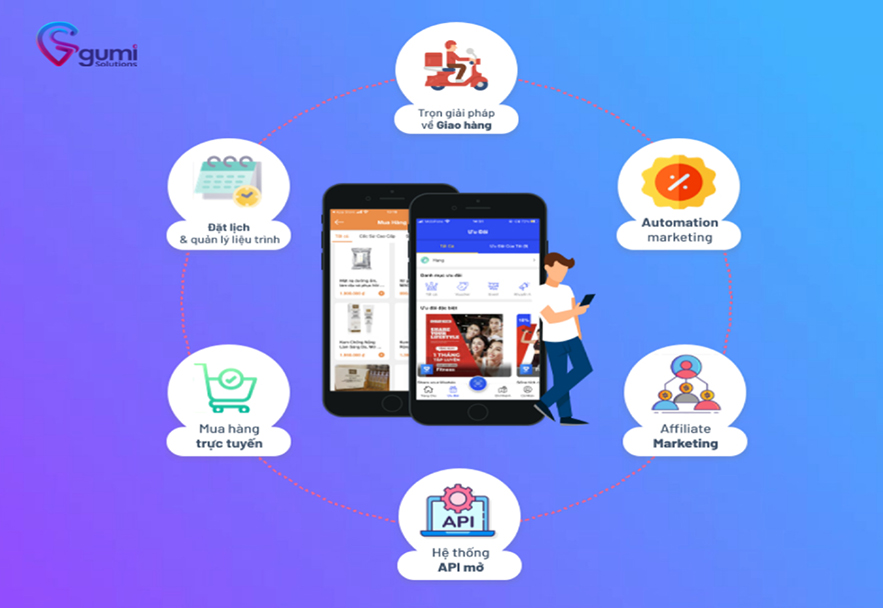People in Southeast Asia are increasingly turning to e-commerce to meet their purchasing demands, and retailers in the Pacific area are getting the majority of their online orders through mobile apps. According to new research conducted in Singapore, Thailand, and Indonesia, 72 percent of mobile app users prefer interacting with retail brands to purchasing in-store or online.
Retail applications are gradually becoming more popular in the modern shopping era, with the average person installing four to six retail apps on their phones. The remaining 36%, on the other hand, indicated they have uninstalled retail apps on their phones because they prefer apps that provide comparable services.
Despite fierce competition in the app market, merchants have an incentive to invest more in current apps or to enter the mobile application market if they haven’t previously. A valuable mobile app, according to a new survey, is after they achieve satisfaction and brand loyalty.
Approximately 99 percent of individuals who highly recommend an app are also likely to remain a customer of the firm in the near future. When comparing app consumers to website-only customers, the average transaction value increased by 31%.
But are brands realizing the full potential of retail apps to build customer loyalty, develop better app engagement, and ultimately drive sales?
Convenience is king, experience is queen
Convenience, experience (UX / UI) on mobile applications always accounts for more than 70% of users’ decision to use
The app’s ease of use and accessibility are appreciated by users. Mobile apps account for more than 70% of the goods value in online retail. According to our research, 85 percent of app users believe that purchasing via apps is more convenient than shopping in a store.
However, people are using the app for more than simply making purchases. The average person does five to eight different activities per day on a retail app – from browsing products to redeeming rewards. Apps provide access to unique experiences that influence users’ ultimate purchasing decisions, even when they’re not making in-app purchases.
That’s why building a rich retail app that closely replicates the in-store shopping experience is key to building engagement and driving sales. In particular, when people are satisfied with the app experience, they are 56% more likely to recommend the brand to family and friends.
Experiential shopping and reverse image search are two of the more engaging retail apps on the market, replicating the feeling of buying in-store. This is a chance for brands to use cutting-edge technology like augmented reality to improve the virtual buying experience.
Adapt to how people use and interact with apps
The way consumers utilize retail apps differs by area. These applications are popular in Singapore, where people use them to augment their buying research. People in Indonesia and Thailand interact with brands mostly through retail applications. However, in Thailand, users of retail applications are extremely sociable, readily sharing their experiences and purchases. The market application is more extensively employed in Indonesia.
Because of these regional disparities, businesses must consider local factors while developing app engagement strategy. Consider how gambling as a mobile engagement technique has been used to successfully attract people in the market. It’s a strategy that brand-specific apps can utilize to boost user engagement, if they have any.
When creating apps, businesses must consider which features are most popular with users. People appreciate marketplace apps because they provide services such as:
- Wide selection of products
- Simple and useful navigation
- Recommend products based on their search history
Product and service standard evaluation is becoming increasingly critical. About 55% of app users check customer reviews of retail applications on a regular basis. As a result, ratings are critical in getting people to download your app and encouraging them to keep using it.
All of these elements contribute to app satisfaction, which leads to brand loyalty. According to research, 67% of “most frequent” users are satisfied with a brand, and 93% of “most frequent” users are inclined to stick with it.
To develop trust, give consumers a safe app experience
When dealing with brands online, people want to feel comfortable. People trust an app’s authenticity more than a website’s because an app is tougher to fake than a website. 52 percent of app users said they will continue to use one for safety and security. Notably, 72% of app users believe they trust applications to keep their personal information safe. The remaining 28%, on the other hand, have little faith in applications to keep their personal information safe, indicating that many individuals need to rethink their minds.
It’s also worth noting that because specialist brand applications are seen as the official channel, customers are more confident in the legitimacy of a product. Brands can introduce elements that give users a sense of security to improve user trust:
- Trusted and accessible one-stop customer service to solve problems
- Hassle-free return policy
- The policy of withholding payment until the product is received in good condition – a method commonly used in applications in the marketplace
Brands can establish brand loyalty and keep consumers coming back by winning users’ trust through their apps.
Characteristics of a Loyalty App
Use apps to differentiate your brand
To begin, “The Great Retail Migration” entails investing in high-quality retail apps in order to keep customers, pique their attention, and gain their confidence. Creating a smooth and immersive user experience can make all the difference for your business, even if the situation is mixed and ambiguous.
Finally, the TTD Loyalty App mobile application is the most ideal and effective customer care solution using mobile applications operating on iOS and Android platforms to let businesses communicate directly with loyal consumers and help keep loyal customers.
Contact : gumi Solutions
Email : contact@gumiviet.com
Hotline : 028 3930 2470 – 091 416 3232



